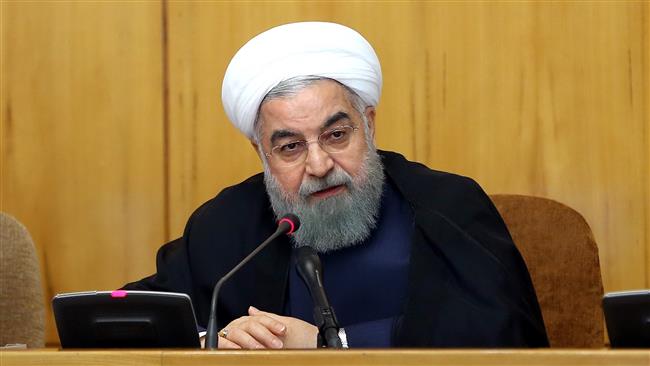Iran’s regime stepped up its criticism of US sanctions on Wednesday, even warning of military retaliation.
President Rouhani (pictured) led yesterday’s response, following the intervention of Foreign Minister Mohammad Javad Zarif on Tuesday during his stay in New York.
Addressing the Cabinet, Rouhani linked sanctions and the US position on the 2015 nuclear deal to the Trump Administration’s approach to international commitments:
Americans have withdrawn from Paris Agreement [on climate change], agreements with Cuba and many other commitments in their agreements with North America and East Asia. This indicates that the US cannot claim advocacy for human rights, rule of law and security and stability in the world.
One who is not stable, does not respect the law and regulations and does not stand by its own signature, cannot invite others to stability, security and peace.
See also Iran Daily, July 19: Tehran Campaigns Against New US Sanctions
The Rouhani Government has been concerned about ongoing US sanctions despite implementation from January 2016 of the nuclear deal. The American restrictions have deterred essential trade and investment, especially from European firms fearing US punishment.
The concern has been elevated over the past month by a series of American developments. The Senate has passed a bill for further sanctions, based on Iran’s ballistic missile testing, alleged support of “terrorism”, and human rights record. The legislation is now being considered by the House of Representatives.
The immediate catalyst was the Trump Administration’s decision this week — even as it recertified that Iran has complied with the terms of the nuclear deal — to sanction another 18 Iranian individuals and companies. While the addition to the blacklist is relatively minor, it indicates that there is no possibility of the US easing restrictions for the foreseeable future.
In addition, the Administration is reportedly considering the designation of the Islamic Revolutionary Guards Corps as a “terrorist organization”, a step which has agitated the elite military organization.
Trying to separate Europe and others from Washington, Rouhani said yesterday, “Iran will always stand by its international commitments, although Americans are giving with one hand and taking away with the other.”
He tried to cover up economic concerns with the insistence:
The Americans are angry about the post-JCPOA [Joint Comprehensive Plan of Action] atmosphere and are concerned about Iran’s better economic relations with Asia and Europe. Of course it is natural that they are angry about this because they are not gaining any profit from this.
While being restrained in his presentation of Iranian retaliation — “We must be vigilant not to get caught in their trap, not playing in US’ side of the pitch and at the same time live up to our commitments, walking on the path of progress” — Rouhani assured, “The great Iranian nation will respond accordingly.”
“US Should Move Its Bases”
The head of the IRGC, Major General Mohammad Ali Jafari, went much farther than Rouhani as he warned in a speech in Iran’s second city Mashhad:
If the US seeks to pursue sanctions against our defense and the IRGC, before that it should move its regional bases 1,000 kilometers away from Iran. It should know that it has to pay a high price for its miscalculation.
Rather than stepping back over ballistic missiles, a key basis for further US sanctions, Jafari doubled down with his proclamation that the IRGC is expanding production and capabilities: “Iran’s missile power in the air, sea, and on land is rapidly increasing, and this is an inalienable principle for us.”

